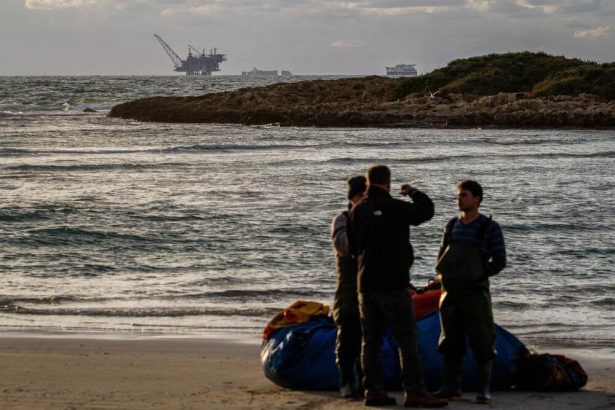Israel has discovered enough natural gas to become a regional energy exporter. As Europe wrestles with its energy crisis Calev Ben-Dor talks to experts about the economic, political and symbolic significance of the 2022 Israel-Egypt-EU Memorandum of Understanding.
The audience in the Chagall Hall was silent as Golda Meir began her speech in honour of her good friend, West German premier Willy Brandt. With the famous Biblical tapestries behind her, Israel’s first female Prime Minister took the opportunity to give her own analysis of the Exodus story. ‘What the Israelis have against Moses’, Meir said, ‘is that he took us 40 years through the desert in order to bring us to the one spot in the Middle East that has no oil!’
Brandt’s historic visit took place in June 1973, eight years after the establishment of bilateral ties and mere months before the Egyptian and Syrian surprise attack on Israel. The ensuing oil crisis, when Arab members of the Organisation of Petroleum Exporting Countries (OPEC) imposed an embargo against the United States for its decision to re-supply the IDF, was not yet on policy makers’ radars. Israel was certainly aware of its reliance on outside energy but had yet to fully internalise its precarious geo-strategic situation.
Meir was not only funny but prescient. However, decades later, Israel’s energy security policy was turned on its head with the 2009 discovery of the Tamar natural gas field. Estimated to hold just over 200 billion cubic metres (BCM), Tamar’s capacity can service Israel’s electricity needs for the next 25-30 years. Meanwhile, the detection of the Leviathan field in December 2010, estimated to hold 470-620 BCM, not only guaranteed Israeli ‘energy independence’, but also heralded the possibility of export. Two additional smaller fields in Israeli territorial waters – Karish and Tanin – brought an estimated total of Israeli natural gas capacity to 950 BCM.
One can only hope that Moses’ reputation – already high amongst Jewish, Christian, and Muslim believers – was enhanced amongst secular Israelis too.
The EU comes to Jerusalem
In June 2022, almost half a century after Brandt’s visit, another German leader, European Commission chief Ursula von der Leyen, made her way to Jerusalem. Having emphasised Israel and Europe’s shared democratic values and past, Von der Leyen announced that the EU was exploring ways to step up energy cooperation with the Jewish state through work on an underwater power cable and a gas pipeline in the eastern Mediterranean. During the visit, a Memorandum of Understanding (MOU) was signed between the EU, Israel and Egypt. ‘This is an investment in both Europe’s and Israel’s energy security’, Von der Leyen proclaimed.
Shared values are well and good, but the larger component behind the visit was Russia’s February 2022 invasion of Ukraine. Putin’s subsequent weaponisation of energy towards Europe was a wake-up call and led to a European determination to cut its dependency on Russian energy. But that is easier said than done. The EU uses approximately 392 BCM of gas a year, of which 339 BCM are imported and around 155 BCM – 40 per cent – is supplied by Russia. (Other notable suppliers are Norway at 21 per cent, Algeria at 8 per cent and Qatar at 5 per cent). ‘The EU is belatedly realising that its dependence on Russia was a huge mistake’, Simon Henderson, the Baker fellow and director of the Bernstein Program on Gulf and Energy Policy at The Washington Institute told Fathom.
What further complicates the challenge for the EU is the designation of natural gas as a ‘non-green’ energy source within the European Green Deal, which commits the continent to reduce greenhouse gas emissions, by at least 55 per cent by the end of decade and to become climate neutral in 2050. ‘There was a dispute in EU green nomenclature whether to include natural gas and nuclear energy’ from the phase-out, Emily Stromquist, a Non-Resident Scholar at the Middle East Institute tells Fathom. ‘The EU ended up including them and Liquefying Natural Gas (LNG) rapidly became the centrepiece of European energy security in the wake of Russia’s invasion of Ukraine.’ However because of the commitment to go green, finding new sources of natural gas can only be a band aid. ‘The resulting, higher prices, and the impacts on gas markets elsewhere, especially in Asia where consumers were forced to switch to more coal, are not sustainable. If gas is to play a part in a clean energy future, significant advancements and investments in decarbonisation are crucial’ says Stromquist.
This essay examines two parallel – and sometimes interlocking – questions. In the context of such a high percentage of supply coming from Russia to what extent can Europe cut its dependency on Moscow? And what is the potential contribution of Israel to this effort?
Crossing the Rubicon
As summer 2022 ended, preparation in Europe for winter began in earnest. Hanover turned off the hot water in public buildings and banned the use of floodlights on monuments. Spain decreed that air conditioning should not be turned on below 27C in summer, and central heating must not rise above 19C in winter.
There were important successes. Germany recently opened its first ever LNG import terminal, a Floating Storage and Regasification Unit (FSRU) and the country is building three more. But in general, it has been an uphill – and painful – struggle. British regulator Ofgem announced that the energy price cap would soar by 80 per cent a year from October. The Chairman of the Commons Business, Energy and Industrial Strategy Committee warned the vast majority of Brits may now be in fuel poverty. Money saving expert Martin Lewis said the energy crisis would lead to lost lives unless the government acts to tackle the issue.
Nor is the pinch being felt only in Britain: Price hikes have occurred across Europe, with financial services provider Allianz estimating that the number of EU households facing energy poverty has doubled. Three-quarters of companies in Germany say they’re experiencing ‘severe strain’ from spiralling energy prices. ‘It’s going to be a tough winter’, Gabriel Mitchell, a Policy Fellow at the Mitvim Institute predicted to Fathom a few months ago. ‘Europeans may well be told to wear extra layers.’
Yet despite the difficulties, Europe seems to have crossed the Rubicon in deciding to cut its dependence on Russian gas. ‘After a slow start in 2022 following Russia’s invasion of Ukraine,’ Henning Gloystein, Director of Energy, Climate & Resources at the Eurasia Group tells Fathom, ‘Europe became serious about phasing out Russian fossil fuel imports (as seen in the sky-high prices industry and households have been paying for that shift).’ Such a move didn’t happen immediately after Russia’s invasion. Yet according to Gloystein, ‘it has now sunk in that nobody in the EU (with the possible exception of Hungary) can rely on Russian energy anymore while Putin or anyone of the siloviki are in power.’ Gloystein also warns of tough times ahead. ‘Although the phase-out has so far happened much more successfully than anticipated, ongoing high consumer energy costs still threaten a recession across most of Europe, even if there is now a much lower risk of energy shortages in Europe this winter and next.’
Israel’s (long) journey towards becoming a regional energy power
The gas discoveries in Tamar and Leviathan provided Israel with energy independence. Yet, ‘while a blessing’, Elai Rettig, Bar Ilan Assistant Professor specialising in energy security and energy geopolitics, tells Fathom, ‘Israel’s energy discoveries gave the country two headaches.’ Headache number one goes to the heart of the challenging process of how to bring newly found gas reserves to market. The first stage is finding companies willing to explore for gas. Once gas is found, one needs to find a market for it. A pipeline then needs to be built, often a long and expensive business (although sometimes pipelines already exist and LNG facilities nearby can provide ready options for export). Finally, domestic politics need to facilitate these decisions. ‘One needs the technical, commercial, domestic-political and geopolitical pieces to align,’ explains Mitchell.
A country may have a plentiful amount of gas in its territorial waters. But ‘if you can’t prove to energy companies that you have someone to sell the gas to’, says Rettig, ‘no one is going to come and find it. And if you can’t even sell what you’ve already found, no one is going to look for more.’ This was Israel’s challenge. Rettig describes trade deals between countries and companies as like a long-term, complex relationship with no get out clauses. ‘When you do a trade deal, it’s the Catholic way’, he says. ‘It takes years, costs lots, and then you are locked in’
The Jewish state may have found plentiful amounts of natural gas, but it was missing a partner for a Catholic marriage.
Geostrategic politics complicates export options
The second headache was that while these discoveries were locally significant, they were ‘a drop in the ocean globally’, according to Rettig. The amount of gas discovered ‘wouldn’t justify the huge infrastructure that would be needed to get things to Europe.’
Having been blessed with more gas than it needed for itself, but not enough to become a major player in European markets, Israel focused closer to home. One idea was to build an undersea pipeline from Leviathan to Turkey which could then be transported via pipeline to southern Europe. ‘When one looks around the Eastern Mediterranean market, Turkey would be the most natural partner and consumer of both Israeli and regional natural gas’, explains Mitchell. In addition to Turkey’s large economy, high demand, and limited domestic energy resources, the country is connected to pipelines running from the east – the Caucuses and Middle East – to the European market. ‘Putting geopolitics aside’, says Mitchell, ‘it should have happened years ago.’
Yet this is where problematic geostrategic considerations came in. Any such pipeline would have to traverse the Syrian and Lebanese, or Cypriot Exclusive Economic Zones to reach the Turkish coast. Even were these issues to be resolved, the lack of stability in Israeli-Turkish relations posed a problem. The Turkey option ‘makes sense economically’, says Rettig, ‘but politically it was a big problem’. One would need a binding long term contract for 10-15 years and private companies need to know that relations will be stable, and that energy won’t be used as a political weapon.’ Despite the recent diplomatic thaw, long term guarantees like that simply do not exist in Israeli-Turkish relations.
Another option was to build a long pipeline via Cyprus towards Greece which could then transport the gas to European markets through its own two pipelines. The project, dubbed the ‘East Med pipeline’ was popular amongst Israeli, Greek and Cypriot politicians but received a cooler reception amongst energy experts. ‘It’s a nice concept’, says Mitchell, referring to the project that would have been the longest deepest underwater pipeline in the world, ‘but it was never economically viable’. ‘It’s basically space technology’, says Rettig, who explains that the bottom of the sea next to Crete is volcanic and would require complicated and expensive engineering. The Biden Administration was also sceptical and ultimately opposed it publicly. (Amos Hochstein, the State Department’s senior advisor for global energy security, dubbed the pipeline ‘too complicated, too expensive and too late in the arc of history’.) ‘Now the US is against it’, says Mitchell, ‘it’s dead in the water. In fact, it died before it could even make it to the water.’
That left a third route: sending gas to Israel’s neighbours Egypt and Jordan. This option had several advantages. It would strengthen bilateral relations. Israel was already linked to Egypt via an offshore pipeline which went from Ashdod to El Arish. It was possible to additionally link the two countries via the Arab gas pipeline which flows through Jordan and down to Eilat, and then through Sinai to connect at El Arish. Egypt has two LNG stations along the Egyptian coast in Dammieta, 60 km west of Port Said, and Idku, 50 km east of Alexandria. In 2014, a deal was signed between the Tamar field partners and Jordanian owned Arab Potash and Jordan Bromine to sell 500 million USD of gas over 15 years (an additional deal was signed in 2018). In 2016, the Leviathan field partners signed a 10 billion USD deal with the Jordan Electric Power Company for approximately 45bcm of natural gas over 15 years. In 2018, Egypt signed a $15 billion deal with Israeli company Delek Drilling and its US partner, Noble Energy, to transport natural gas there. LNG terminals in Egypt which currently receive Israeli gas have the capacity to export approximately 15-17 BCM of natural gas a year.
‘Like the Tesco slogan, Every little helps’: Eastern Mediterranean gas and the EU
Russia’s energy weaponisation forced Europe into a dilemma. How to break reliance on Moscow, invest in clean energy options and not cause hyper-inflation and high prices for its citizens over the winter? Ultimately the EU chose to prioritise short-term survival (i.e. importing natural gas despite its ‘non-greenness’) over its longer term plan to transition towards clean energy. Within this short-term window the Eastern Mediterranean can provide solutions. According to Stromquist,
In the years ahead, Europe will need to balance dual priorities of ensuring energy security while continuing to progress toward a clean energy future. To this end, Egyptian LNG terminals, which are also supplied by Israel, have been an attractive, immediately available solution for Europe, but the EU will have to make critical decisions about how much to invest in alternative gas supplies and gas infrastructure versus investing in their clean energy agenda.
‘Until as recently as a year ago’, says Gloystein,
LNG exports to Europe was a shaky prospect. They were expensive, there were lots of regulatory hurdles, and because the EU wanted to phase out greenhouse gases, they didn’t want to sign long term contracts, (and of course the Nordstream 2 pipeline was supposed to be coming online). Yet now the EU needs every single source of non-Russian gas they can get their hands on, and half a dozen new LNG import terminals have already started operations in the EU since the start of the war, with more to follow this year.
Energy experts Fathom spoke to were cautiously optimistic that Eastern Mediterranean gas could help Europe but urged against overexcitement. ‘It will help but it is marginal’, Henderson states. ‘On the assumption Israel can provide the natural gas’, Mitchell suggests, ‘the amount Israel could supply to Europe has a maximum range of 10-15 BCM per year, unless there is greater investment made in establishing additional LNG terminals. Big picture, that’s a drop in the ocean. At the same time, the EU is working very hard to diversify all resources that it can around the world – with the US, Qatar, and others – and Israel is one of these.’
Gloystein tends to agree. ‘It won’t be crazy amounts’, he explains, sketching a scenario in which one could pump more Israeli gas out of Leviathan to Egyptian LNG facilities (whose capacity would need to be expanded), and then take it by tanker to Italy into small floating regassification terminals (which would need to be built). ‘Both Greece and Italy have a high reliance on Russian gas. Like the Tesco slogan, every little helps.’
Money Money Money
The key to significantly expanding natural gas exports from the Eastern Mediterranean to Europe is financial investment. Yet this will likely require nation states to provide guarantees. Rettig is sceptical about Europe’s commitment to put its money where its mouth is. ‘Until Europe is serious about building a pipeline, nothing will happen. Instead, they want the free market to do it for them.’ Mitchell agrees:
For the last 10 years everyone has been waiting for the EU to put money down. The EU has deep pockets, but they want to make long term investments. What we are now seeing is the alignment of long-term investments in pipelines with the EU’s economic and energy principles, and prioritization of renewable investment over fossil fuels [such as natural gas].
‘The Europeans are good at shaking hands’, says Rettig, ‘but Israeli decision makers are asking is who is going to pay? Which power plan is going to buy my gas?’
Gloystein though is more optimistic. ‘It will certainly require money and political will to upgrade infrastructure but both of these are in large supply in Brussels,’ he notes. Gloystein believes that during 2023, the EU will be able to successfully wean itself off 155 BCM of Russian gas. ‘They are almost there. It’ll be hard and it’ll cost a fortune but it’s possible’, he predicts.
Symbolism Matters: The Significance of the EU-Israel-Egypt MOU
If the numbers aren’t hugely significant what then of van der Leyen’s MOU? These and other grandiose statements are nothing more than ‘political grandstanding’, argues Peter Stevenson, the Cyprus based Mediterranean Editor for the Middle East Economic Survey (MEES). ‘Politicians will talk up projects and MOUs. But the bottom line is that if the companies don’t see it as making financial sense it won’t happen.’
Mitchell, however, takes a different approach. ‘The MOU is very vague’, he tells Fathom; ‘It doesn’t detail fixed amounts of Israeli gas that will end up in Europe but is rather a general commitment stating the arrangement the parties are interested in making’. In this sense it’s more ‘an arrangement than a contractual obligation’ which ‘enables each side to say that they are on the same page.’ It doesn’t even necessarily break new ground. Instead, ‘it concretises in a more meaningful diplomatic way a pre-existing relationship’.
Perhaps this concretisation of the relationship is the best way to understand what is happening here. ‘The numbers don’t support the hype,’ says Mitchell. ‘But that hype is there for a reason – it expresses a desire to demonstrate that Israel and other countries are supporting the Europe at its time of need. That’s a really important component that shouldn’t be downplayed.’
The primary prism to understand the MOU is thus not via amounts of BCM. ‘The Israeli-Egyptian portion is not significant enough to be a gamechanger per se, but it is a gamechanger in Israel and Egypt’s relationship and cooperation with the EU’, says Mitchell. ‘Having the EU be a party and partner in a potential export agreement is a significant moment, and in fact its partnership with Egypt further solidifies the energy partnership and the opportunities between Israel Egypt and EU.’
‘There is a bit of a gap between expectations and reality’, admits Gloystein, but ‘symbolism matters here. The 2018 Israel-Egypt deal [for Israel to export gas to Egypt] was politically quite remarkable. It provides regional business and stability. So, from an EU perspective this is something to be quite excited about.’ Whether it all works out remains to be seen. ‘But the fact it’s been made public is a statement of commitment that is quite important.’
Brandt’s visit was undoubtedly diplomatically important. But it carried an additional layer of significance. Before the state dinner, the West German premier laid a wreath at Yad Vashem on the granite slab that covers the ashes of victims of the Nazi gas chambers. The Chancellor stepped back, lowered his head, and stood motionless for almost two minutes. Then, in a voice broken with emotion, he read in German Psalm 103 about God’s grace, forgiveness, compassion and love.
Sometimes, symbolism not only matters, but is more important than anything else. During these challenging times for Europe, this may also be the Memorandum of Understanding between the EU, Israel and Egypt.






































